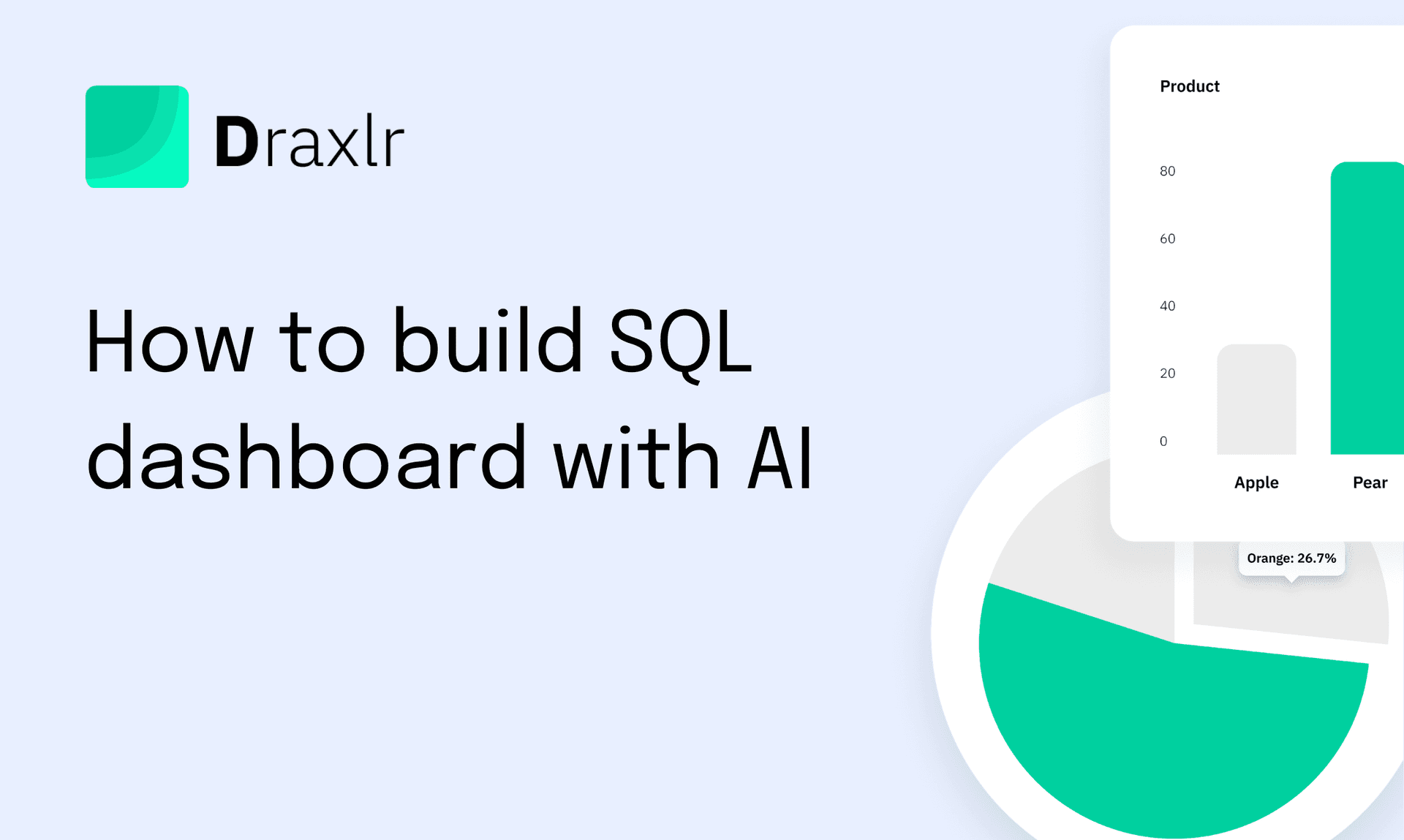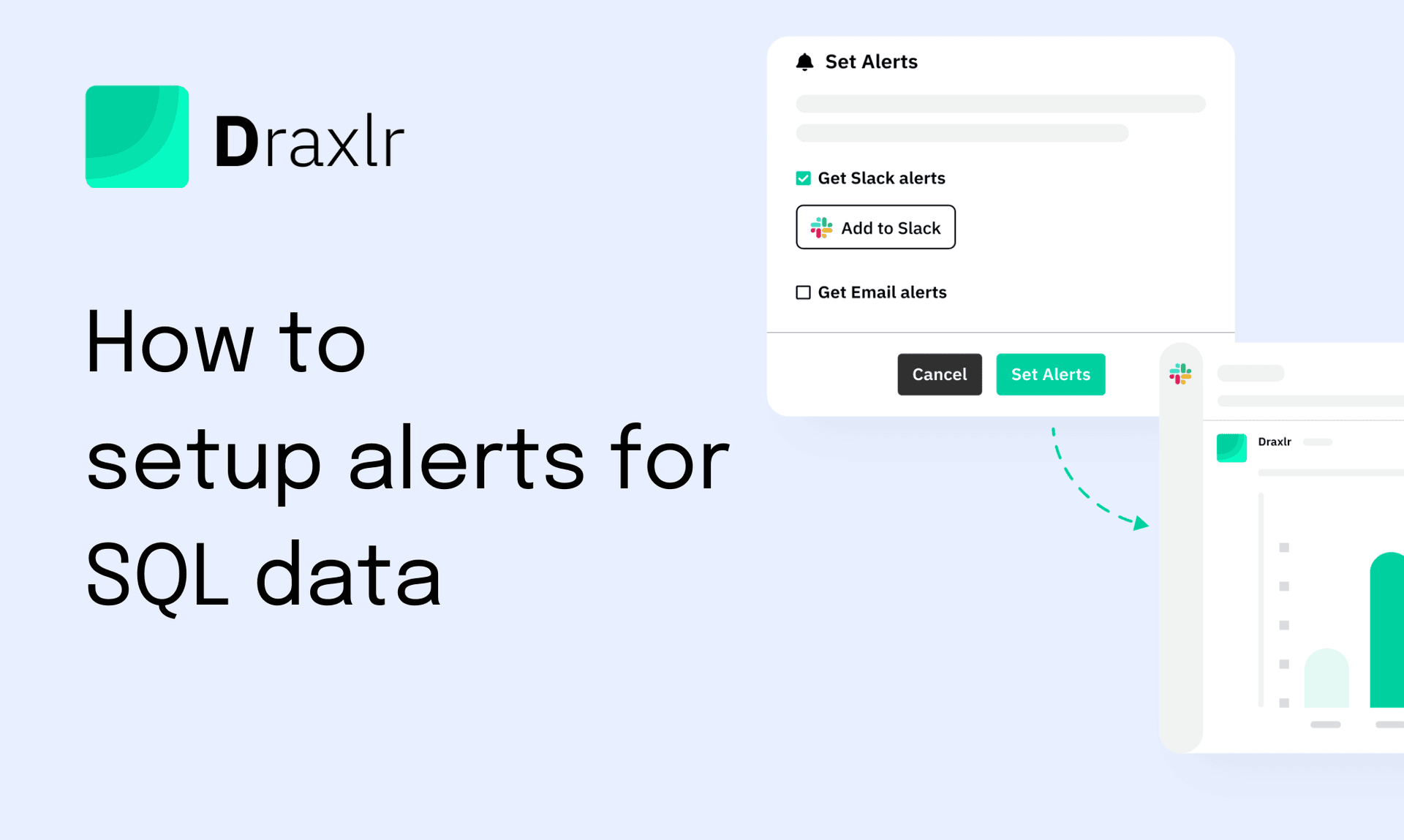How to generate SQL query with AI
Optimise database workflows with AI-generated SQL queries. Streamline development, reduce errors, and enhance efficiency in data management.
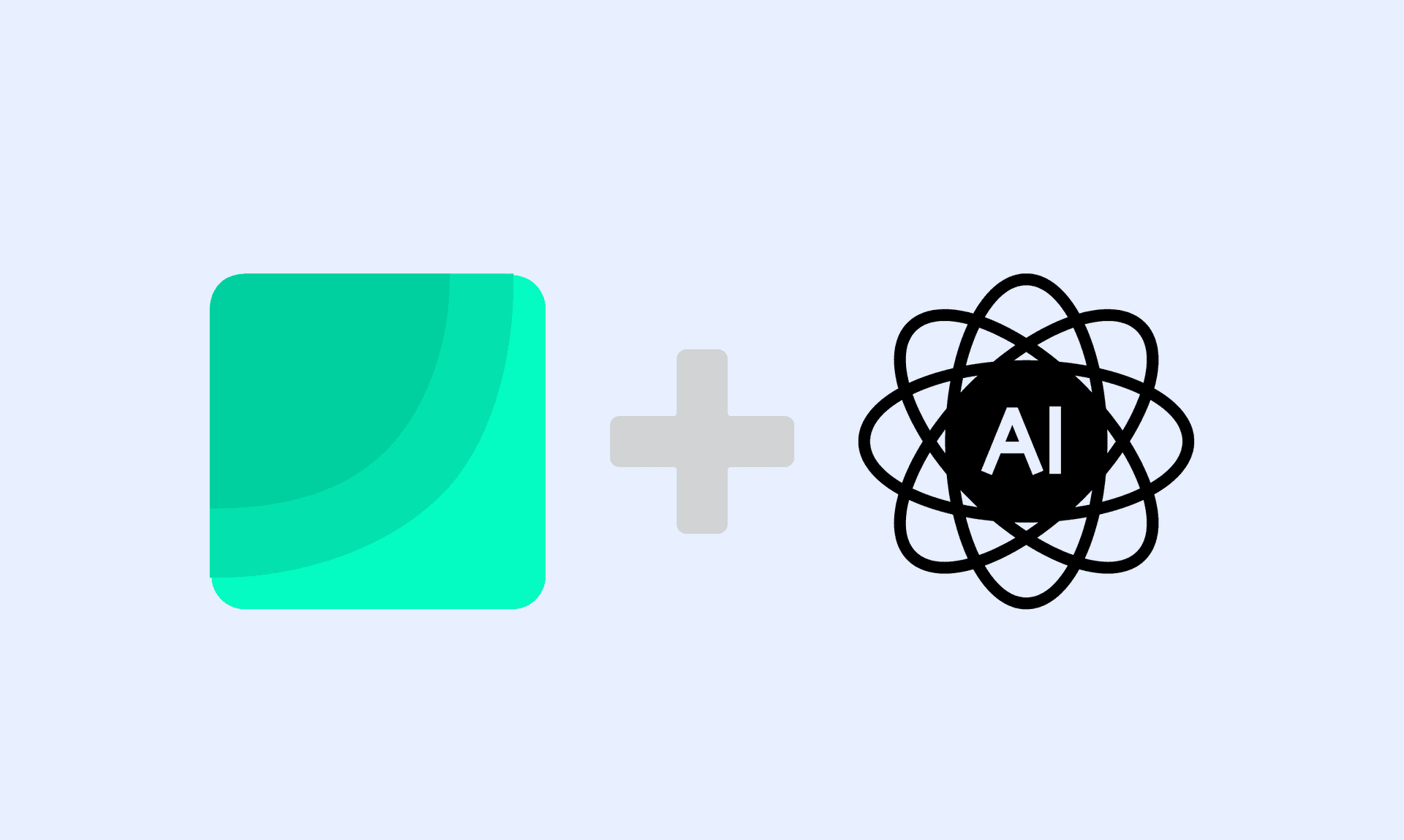
In the ever-evolving landscape of technology, the synergy between artificial intelligence (AI) and database management has become a revolutionary force. One particularly fascinating application of AI in this domain is the generation of SQL queries — an essential skill for data professionals and developers alike.
Structured Query Language (SQL) is the cornerstone of database interactions, enabling users to retrieve, manipulate, and manage data effortlessly. However, crafting efficient and precise SQL queries requires a deep understanding of database structures, relationships, and syntax. This is where AI steps in, reshaping the way we approach and execute SQL query generation.
In this article, we show how you can use Draxlr AI to not only generate SQL for you but also use the result to generate visual insights that can be used to build dashboards.
How can AI help you with SQL?
-
Time saver: Using A.I. saves time on writing complex SQL queries or gives you a base query on which you can build further.
In reality, it's quite common not to have every nuance of SQL syntax committed to memory. Crafting complex SQL queries can be time-consuming, and searching for the right syntax can be a hassle. Artificial Intelligence simplifies the process by allowing you to express your requirements in plain text. The AI seamlessly generates SQL code tailored to your specifications, providing either the precise query you need or a foundational snippet to expand upon.
-
No-code solution to get answers from your data: You don't have to rely on developers to generate SQL queries so that you can get data for your business.
Whether you operate a business with a specialized development team or find yourself as a solo founder with limited technical expertise, leveraging AI can significantly aid in extracting answers and insights from your data.
For instance, if you require a count of customers from the Texas region, a simple inquiry such as "Provide me with a count of customers from the Texas region" is all it takes for the AI to generate the necessary SQL. Draxlr then seamlessly employs that SQL to swiftly retrieve your data within seconds. This streamlined process ensures that, regardless of your technical background, obtaining meaningful information from your dataset becomes an accessible and efficient task.
Using Draxlr AI to generate SQL
Demo of Draxlr AI
-
Connect your database: AI requires your database schema structure to generate accurate SQL results.
Draxlr provides the option to connect to various SQL databases like Postgres, MySQL, MSSQL, MariaDB, Supabase, CockroachDB, BigQuery, Redshift, and more.
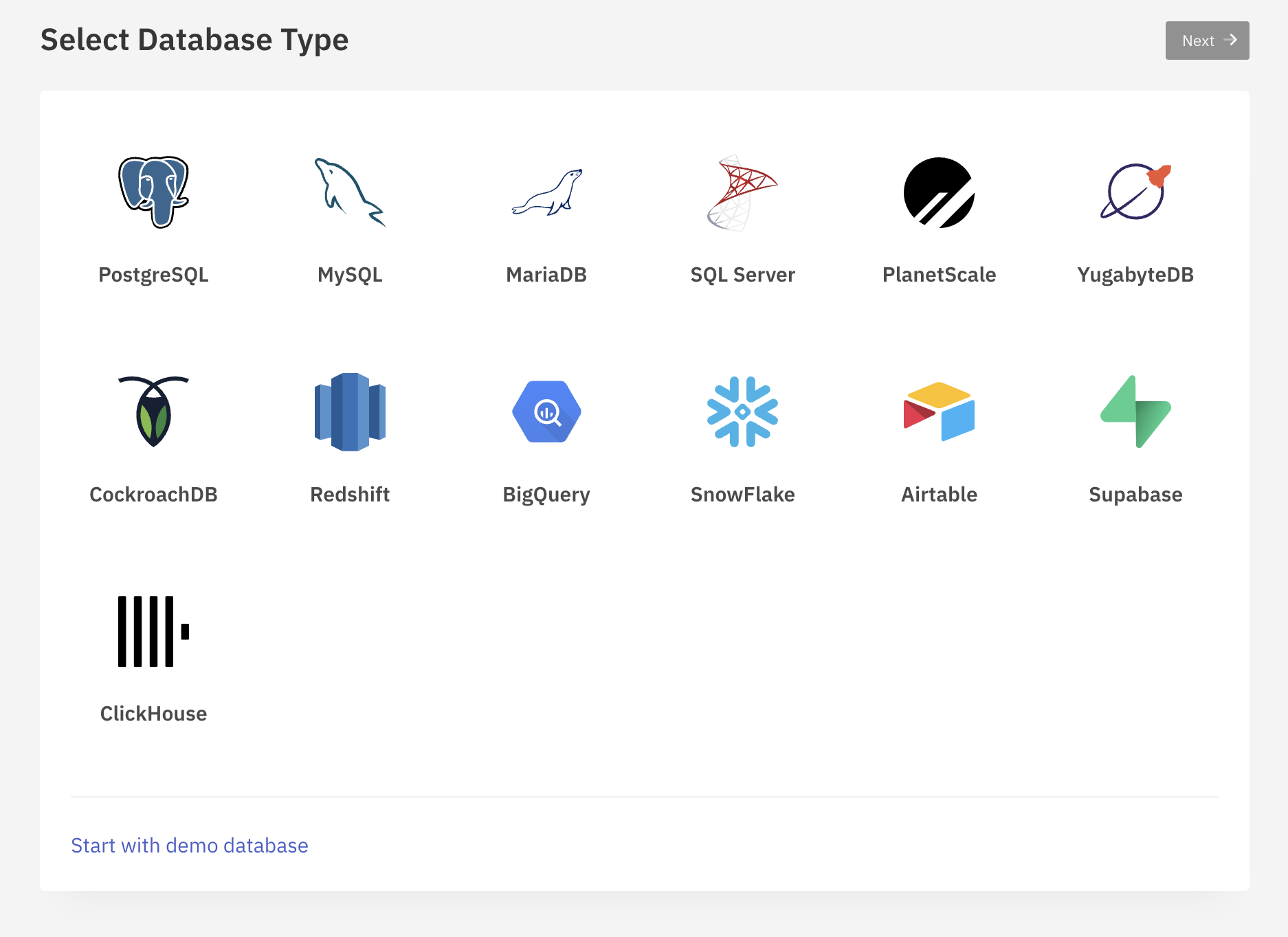
-
Once you have connected your SQL database, click on the AI option in the navbar. Draxlr AI has a chat interface with history.

-
Enter a text message of the result you expect from SQL, and hit enter. In this example, we want to get the order count grouped by employees' name.

-
AI will generate SQL along with a brief explanation based on your message. You can view the SQL query and execute it.
The result from Draxlr AI comes back as:
SELECT CONCAT(FirstName, ' ', LastName) AS EmployeeName, COUNT(Orders.OrderID) AS OrderCount FROM Employees LEFT JOIN Orders ON Employees.EmployeeID=Orders.EmployeeID GROUP BY Employees.EmployeeID, FirstName, LastName ORDER BY OrderCount DESC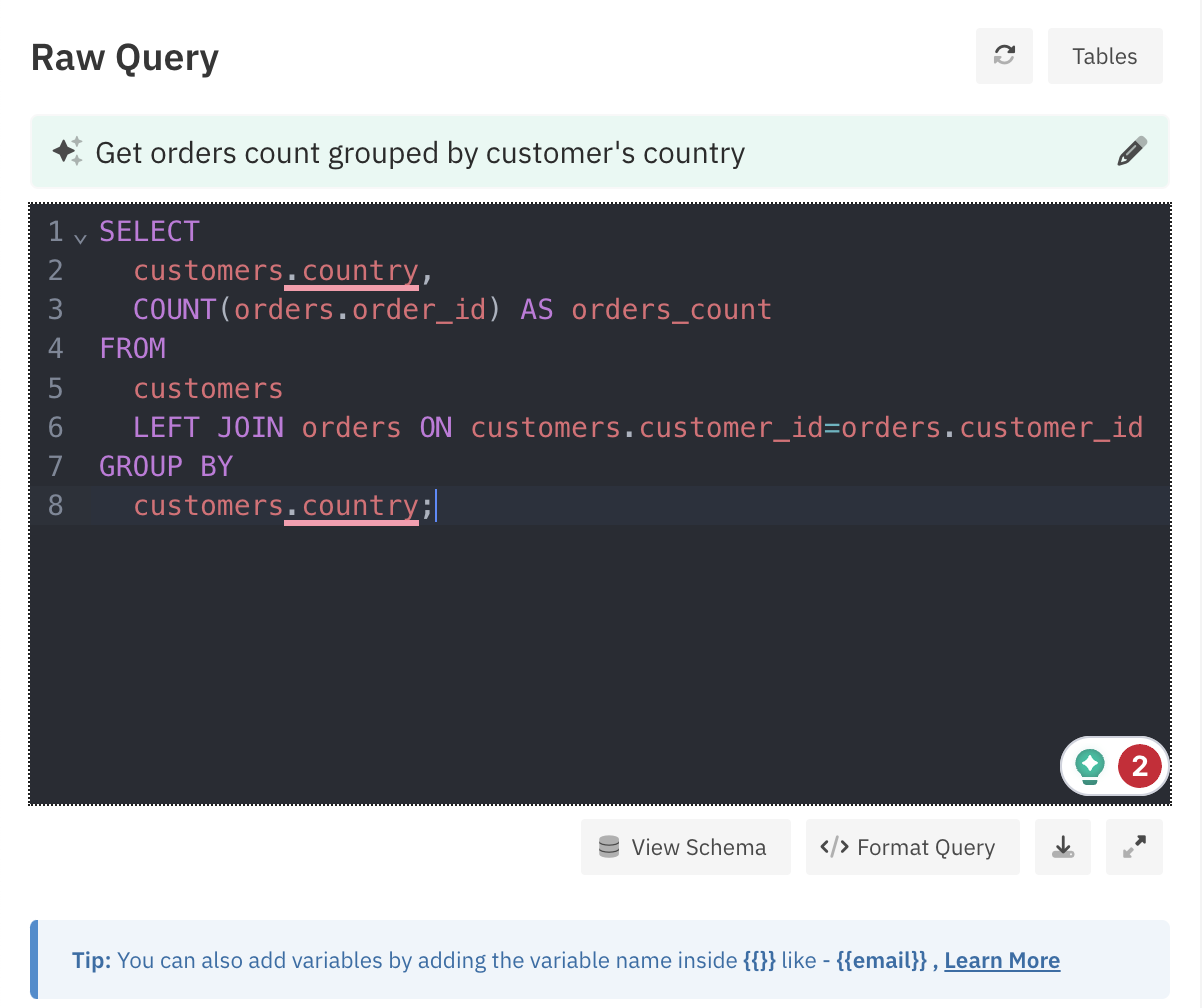
-
You can provide further prompts to get the desired result, like if I want to see only employees with more than 50 orders.

-
You can also customize the result by exploring the SQL Query. You can add changes to the SQL query or change graph attributes to fit your requirements.

-
There is option to add the insight to Dashboard, so you can keep track of the insight.
-
Additionally, you have the flexibility to derive insights through AI without providing explicit requirements.
For instance, if you simply seek insights for a particular table, you can utilize the Generate Insights feature at the table level. This option swiftly produces a myriad of visualizations and statistics within seconds, offering a quick and effortless way to gain a comprehensive understanding of your data.
With the help of AI, you can not only get instant answers from your data but also visualise them as charts within minutes. This saves a lot of back-and-forth with your development team, who otherwise can now focus on more important business features.
This is especially useful for people in the sales or marketing domain, or CXOs who need data to drive important business decisions.
Building dashboards with AI-generated SQL queries
You can add insights generated via AI to a dashboard that will keep you updated about your business performance.
Here is a sample dashboard built with the help of AI:

With Draxlr's dashboard feature, you will utilise features like:
- Embedding Dashboard into your customer-facing application with the current user context.
- Getting alerts via email or Slack to stay updated on crucial business data changes.
- Share dashboards with your team members or stockholders.
- Get a summary email of the dashboard every day.
- Use the live mode to stream the dashboard on TV.
Conclusion
In summary, leveraging AI for SQL query generation streamlines development, enhancing efficiency and accuracy. This automated approach reduces human error, saves time, and adapts to evolving database structures.
As AI continues to advance, integrating it into query generation promises ongoing innovation, allowing developers to focus on high-level tasks while intelligent systems handle intricate query creation. This evolution represents a significant leap forward in the intersection of AI and database management, providing organisations with a powerful tool for agile and data-driven decision-making.
- Vivek
